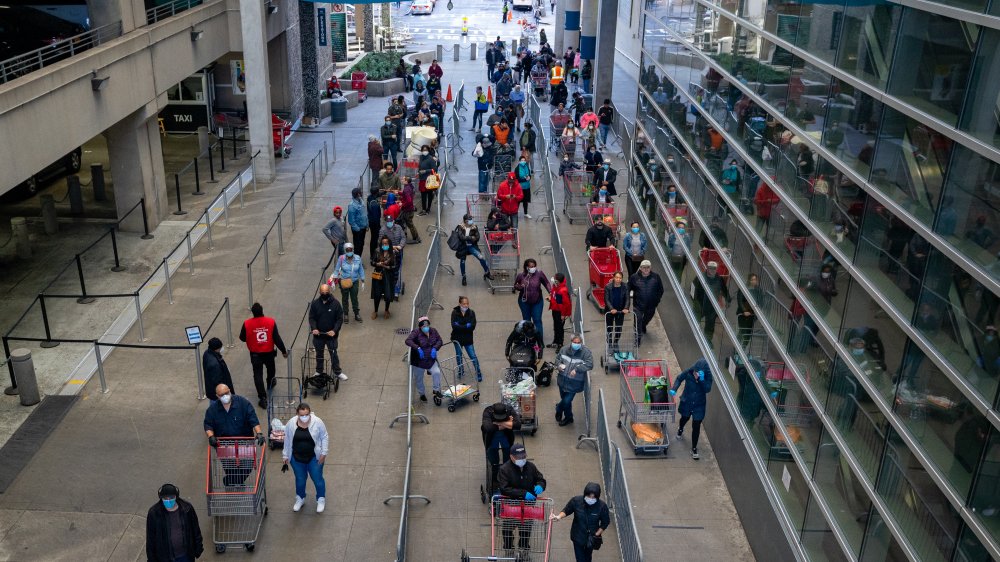The Truth About Costco's Major Membership Policy Change
If you're thinking of heading to Costco with family and friends to get your bulk shopping done, now is not the time to do it. While Costco used to allow a cardholder to bring three adults and children into the store, the warehouse store has had to change its policy to make room for new social distancing requirements to try and stop the spread of the COVID-19 coronavirus. New rules now state that one membership card will only allow for two people to enter the store; and because the rules aren't clear on what two "people" means, the second person (other than the cardholder) could be another adult or the cardholder's child (via The Motley Fool).
Costco says the change to its membership policy is a move to comply with public health guidelines, and it's not the first change the warehouse store has had to roll out since the coronavirus pandemic put most of the country under lockdown. Costco now opens at 8 a.m. on Tuesday, Wednesday, and Thursday to allow for seniors aged 60 and above, as well as the disabled, to shop ahead of the crowds, and it's closing earlier — at 6:30 p.m. It's giving priority access to healthcare workers and first responders. Certain departments, like the hearing aid, optical, floral and jewelry departments will either be cutting service or shut down altogether. The company has also barred members from returning items like toilet paper, bottled water, sanitizing wipes, paper towels, rice, and disinfecting spray (via Costco).
There may be more changes ahead for Costco
Costco has been taking proactive steps to protect its members and staff long before COVID-19 shut down most of the country. It may feel like a lifetime ago, but early in March, it had stopped giving out samples, and had begun to increase sanitizing efforts and leaving wipes around for customers at the store (via Las Vegas Review-Journal). Just a little over two weeks after that, in the middle of the month, it scaled back its menu, and closed the dining area to move to takeout only (via Nasdaq).
None of these moves should have surprised us, because Costco has 782 warehouses outside of the United States; some of them are located in countries that have been badly hit by the coronavirus pandemic including China, South Korea, Spain, and France (via Yahoo Finance). Costco's customer experience keeps the chain at the top of American Consumer Satisfaction Index (ASCI), and it has a 90 percent member retention rate. On Forbes, customer relations expert Blake Morgan gave Costco top marks for innovating customer experience in the middle of a pandemic by taking the steps that it did to protect the health of its customers and staff. It also continues to builds customer loyalty by offering high-quality, Kirkland-branded products, and it still continues to focus on quality over quantity with the products that it sells.
Costco has stayed steps ahead of other retailers
But the measures it took to safeguard public health and promote social distancing has hurt Costco's earnings. The warehouse store might have respond quickly to keep up with developments triggered by the coronavirus pandemic. Early images of panic-buying across the country saw people hitting Costco to stock up on staples like toilet paper and household cleaners. And while Costco's overall sales numbers are good, its bottom line is actually being hurt by social distancing measures and by the closure of departments which aren't considered essential, (via MarketWatch).
To explain the changes, Costco's CEO Craig Jelinek posted a message on the company's site, where he said more modifications could be expected as the situation changes. He explained, "While the circumstances continue to change and we modify our operations as necessary, we thank you for your patience and cooperation. As new developments occur, be assured we are committed to taking care of our members and employees and to our mission of providing low prices, quality merchandise and exceptional service."
Costco's pricing structure will keep customers happy
Social distancing aside, we don't see loyal members abandoning Costco for higher-priced supermarkets anytime soon, particularly since food manufacturing companies are already talking about cutting the discounts and promotions they offer — which translates into rising grocery prices. These companies include Kelloggs, the J.M. Smucker Company, which makes peanut butter, coffee, and pet foods; and Conagra who makes frozen foods like Healthy Choice (via MarketWatch).
Conagra's Chief Executive Sean Connolly explained "...we're in daily discussions with our customers on how to help them meet the needs of their shoppers. And many customers are looking to pull back on promotions as they try to manage the basics of just keeping their shelves stocked." While reducing discounts mean shoppers will be discouraged from going to stores, investment bank JP Morgan thinks retail sales would go up by 5 percent if all discounts disappeared, because 22 percent of items on supermarket shelves are discounted. This puts Costco, with its value proposition, in a position to benefit.



